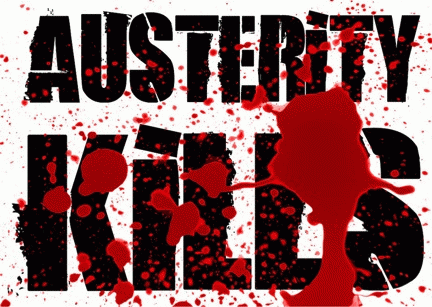"The referendum of 5 July will stay in history as a unique moment when a small European nation rose up against debt-bondage." Yanis Varoufakis, Finance Minister, Greece
Sixty percent of Greek voters rejected the financial bailout proposal offered by the European Union (EU) in Sunday's referendum. The EU-IMF proposal relied heavily on austerity, which would have taken current financial hardships to nightmarish proportions for the vast majority of Greeks. (Image)
As it's used in international finance, austerity is best understood as Robin Hood in reverse. The big banks and their stooges in government make bad deals all over the world to finance national (sovereign) debt, the deals fall apart, and then the banks insist that citizens of the debtor nation pay back the loans by sacrificing social services, public works, retirement programs, etc.
It doesn't matter that the banks knew beforehand that the loans would be impossible to pay off.
It doesn't matter that the government leaders making the deals knew the loans were dead on arrival.
It doesn't matter that the people expected to pay off the loan knew nothing, not one single thing, about the details of the loans and never, not once, provided their consent.
The only thing that matters is the payoff for the big banks and their political front men and women.
The Greek vote came after six austerity plans in five years during which major national resources were diverted from the people to cover bad paper issued by the international banking cartels. The purpose of each plan was "debt sustainability" for Greece, defined as ongoing payments to the international banking cartel.
In 2015, the Greek election resulted in a significant shift in ruling parties. The Coalition of the Radical Left (Syriza), an aggregation of leftist parties ranging from Marxists to social democrats, joined with Independent Greeks, a coalition of right wing parties, to form a government. Leftist Alexis Tsipris was elected Prime Minister. At the same time, the EU, headed by the German Finance Ministry, began pressing for a resolution of the Greek debt crisis.
Bad Faith Negotiations by the EU
Over the past five months, little progress emerged from negotiations between Greece and the EU. Tsipris asked for a year or two of debt relief for Greece and was promptly turned down. An EU negotiations insider told the Guardian (July 4), "Debt relief was not on the table during negotiations to extend Greece's existing bailout programme."
The EU's exclusion of debt relief offers an elegant explanation for the failure of the negotiations and the utter insincerity and mendacity of EU strategy to deal with sovereign debt bailouts. Why is that?
There is a significant overlap among the European Union financial powers and the International Monetary Fund. Germany, France, and the United Kingdom control a share of IMF voting equal to that of the United States. IMF officials are appointed by national governments. The IMF is part of the Greek debt package. Without any doubt, EU negotiators had full access to IMF data.
What did the IMF say about the Greek national debt and realistic scenarios for repayment?
"The International Monetary Fund has electrified the referendum debate in Greece after it conceded that the crisis-ridden country needs up to 60bn ( 42bn) of extra funds over the next three years and large-scale debt relief to create a breathing space and stabilize the economy." Guardian, July 2
The
report concluded that the following elements were critical to a
realistic chance of success: debt relief, major concessions in interest
rates, "hair cuts" for lenders near 30% of GDP; and major infusions of
new capital over the next decade at least. Guardian, July 2
(Note: You can view every article as one long page if you sign up as an Advocate Member, or higher).





